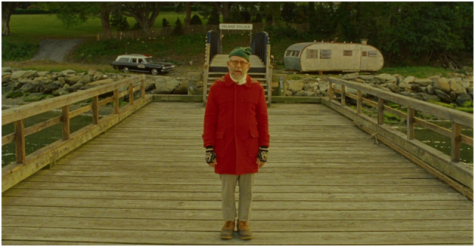Movie Monday with Luke: ‘Moonrise Kingdom safe, not challenging’
September 21, 2015
In the New 10s, quirky director Wes Anderson has enjoyed quite the renaissance. His indie-isms resonate with young adults of the modern era, satisfying their constant craving for being “different.” In this modern era, “different” has less of a broad definition than it used to. It means self-aware, ironic (which has a new definition as well), mismatched colors, thick glasses and drab old music on record players. It means denying a certain perception of modernity that encompasses anything the slightest bit unsafe, leaving all believers with very few options as to what they can say, where they can go and what they can see. Perhaps it was this lack of options that led millions to theaters in 2012 to catch a 94-minute glimpse of Wes Anderson’s “Moonrise Kingdom,” a cute but flat affair.
“Moonrise Kingdom” takes place in an oddly yellow 1965 New England, following two troubled 12-year-old penpals, an orphaned boy scout named Sam and a wannabe-orphan introvert named Suzy (played by newcomers Jared Gilman and Kara Hayward), who decide to run away together. They’re pursued through the woods by Sam’s concerned Scoutmaster (Edward Norton), Suzy’s distant father (Bill Murray) and control-freak mother (Frances McDormand), a police chief (Bruce Willis), and a whole lot of boy scouts, while a cold Social Services agent (Tilda Swinton) awaits Sam’s arrival so she can fry his brain and make him a good boy.
From that description, what stands out far above anything else is the all-star cast. Bruce Willis? Bill Murray? Anderson even managed to nab Frances McDormand, star of one his obvious inspirations, “Fargo.” That’s another laid-back, awkward film with an all-star cast, translated into Average Joes who use their Minnesota mannerisms to try and cover their doubts and dark secrets, to varying degrees of success. “Moonrise Kingdom” lacks most aspects of what made that style work: the depth, the nuance and the culture.
Anderson has an extremely wasteful habit of using his actors as pretty statues to gawk at. Oftentimes, he’ll have them stand square in front of the camera in their quirky suits and dresses, perfectly straight, perfectly still, for moments at a time. “What do you think? Do you like my outfit? Do you like me?” The only reason this film had to eschew an entirely unknown cast is so the audience’s answer to the latter wouldn’t be a resounding “No.” Otherwise, a dozen people pulled off the street could have done just as well. This isn’t an insult to the actors whatsoever. Murray and McDormand are particularly impressive in other efforts, but during their introductory scene in which they monotonously mumble through a half-argument about the likelihood of the runaway Sam winding up in their vicinity, I can’t help but imagine that during filming, Anderson went “Cut. Do it again, but worse.”
Child actors can seriously affect a film’s reception. The most well-regarded movies often have their child actors regarded as a huge bleak spot, and when they’re good, they’re regarded as the main draw of the movie (for example, “Super 8″). Anderson manages to avoid this entirely due to the fact that he doesn’t want the acting to be good. Gilman and Hayward are free to deliver their lines as awkwardly as they want. There’s a scene in which Hayward mispronounces “stick” as “sick,” then stops and retries her line. It was allowed into the final cut because it fit with the rest of the film’s awkward tone. Or perhaps it was actually scripted. Either way, it’s not particularly impressive, but a revealing display of Anderson’s safe, foolproof strategy of mediocrity.
The precocious romance between Sam and Suzy is the high-point of the movie. Their relationship is not a particularly unique affair, veering into “Romeo and Juliet” territory shockingly fast, but it sure is cute. They’re adorably supportive of each other, even through their disagreements, notably when Suzy tells Sam she wishes she were an orphan like him. The sincerity in Sam’s response is something plenty of adults can learn from. Their relationship is believable, too; the film speeds us through all the letters they sent each other in the year preceding their escapade, giving us only the first few sentences of each before cutting off mid-sentence. We see them progress from comments on their first meeting, to courteous advice, to daily anecdotes about the lives they wish they could escape, and finally to plans for an actual escape.
The letter scene is the one part of the film where the extremely straightforward nature of the script excels. Elsewhere, it very much limits the depth of the characters. Everyone says what they mean and mean what they say, and no points of note ever go unsaid. Characters never communicate through action. The main antagonist of the film, the Social Services lady, never moves in any notable way. She’s stationed in a chair during most of her appearances, then she casually strolls around during the climax. Characters in this film are only defined by two things: what they want, and what they wear. The Social Services lady wants to fry Sam’s brain, and she wears a dark, official-looking suit, so she’s the antagonist. Not once does she actually do something. With how shallow everyone is, there’s very little to come to a head during the climax, so it fills in the blanks with a sudden storm of mass destruction, which obviously has little to do with the rest of the film.
Apart from the presence of record players, there’s little to signify the film taking place in 1965, but the New England scenery is a rather pleasant sight. However, it’s weighed-down by an ugly yellow tint that persists during most daytime scenes of the film. I had to check to make sure I’d turned off f.lux multiple times. The camerawork and editing are usually as straightforward as the writing. Most of the gags come from deadpan cuts to silly objects like an 100-foot-high treehouse preceded by matter-of-fact statements about their existence. Action scenes confusingly cut to the end right after they start. It’s difficult to piece together what happens, but that’s ultimately a pointless effort anyway. The plot continues on, that’s all that matters.

SHOULD YOU WATCH IT? If you want a safe, simple romance that might make you say “Awww” a few times, sure, but there’s nothing new or challenging to be found here. There’s no reason to think about it after it’s over, or even while it’s playing. With its stiff directing and shallow writing, “Moonrise Kingdom” is a waste of talent and, ultimately, a waste of time.
WATCH IF YOU LIKE: The film’s obscure inspiration “Melody” from Warren Hussein, or the creepy-as-hell family endeavor of fellow quirky director Spike Jonze, “Where the Wild Things Are.”



TR Hildebrandt • Sep 23, 2015 at 5:23 pm
Not sure I would call anything as meticulously made and stylized as a Wes Anderson movie a “mediocrity,” though I do consider this one of his lesser works. I find his insistence on actorly restraint refreshing and necessary for a comedy of manners, which all of his films are, in part. The classical, palindromic framing you find so “straightforward” I find a delight and a relief in this age of shaky cams and in-your-face banality. I wonder how you feel about his superior films Rushmore, Life Aquatic, Grand Budapest Hotel, and his masterpiece Royal Tenenbaums. We STRONGLY disagree, but I’m happy to find a strong opinion on film here, even if and especially because it’s so contrary to my own. You got me all riled up and itchy for Anderson’s next outing. Maybe not the response you intended 🙂